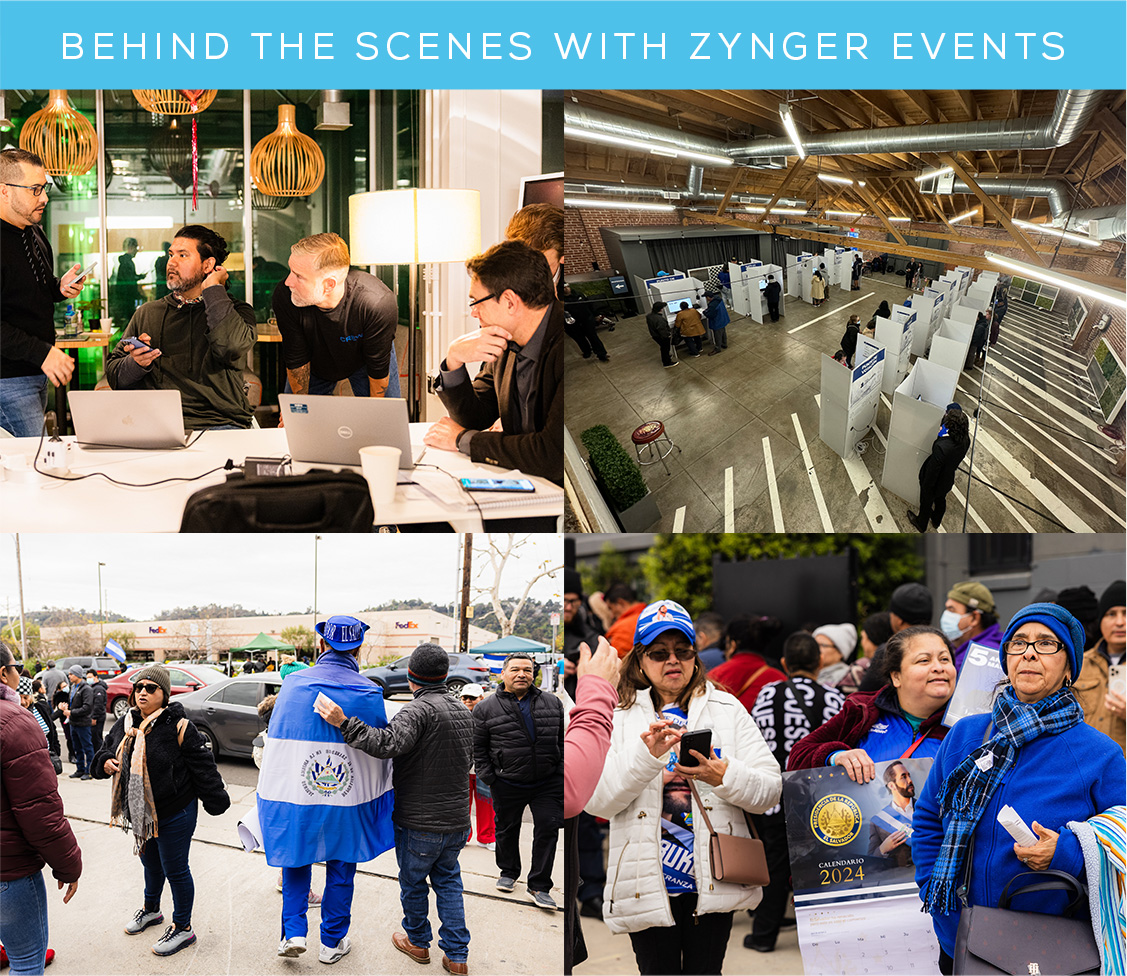
10 Apr Behind the Scenes: What it takes to Produce a Historic Foreign Election in the U.S.
It all began with a simple request from a representative from INDRA, a company hired to work on the Presidential Election for El Salvador. INDRA was seeking assistance in securing venues, for the purposes of remote voting locations in Los Angeles. This would lead Zynger Events to coordinate 46 remote voting locations and assemble a team of 350 staff for a historic El Salvadoran election spanning Canada and the United States.
“For the first time ever, citizens residing outside El Salvador could participate in their country’s presidential election,” remarked Zynger. “We were contacted in November. And as the scope of this project grew, no one anticipated the magnitude of this endeavor.”
Like many monumental undertakings, it had humble beginnings. “It started with Los Angeles, then expanded to San Francisco, and then onto multiple locations,” Zynger recounted. “Initially envisioned as a one-day event on February 4, it quickly evolved into a four-day operation in each city.”
The process encompassed the day of equipment delivery, followed by setup and testing, the voting day itself (extended from 7 a.m. to 7:30 p.m., and in some locations, lasting until midnight to accommodate everyone in line), and finally, the load-out – packing and shipping 500 computers back to their origin in Atlanta.
Originally procured and dispatched by the representative company in Spain, the computers arrived pre-loaded with all the voting information, predominantly in Spanish. “Ninety percent of it was in Spanish, which added complexity despite our efforts to hire bilingual staff,” Zynger remarked. “Moreover, each location featured ID stations to verify voter eligibility, with some larger sites accommodating up to 26 voting stations.”
Given square footage estimates provided by the representative, Zynger Events anticipated the space requirements for each location. However, as the first-ever attempt at such an election, these estimates proved to be conservative. As election day approached, it became evident that additional space was necessary, prompting last-minute arrangements to secure it. Despite these logistical challenges, the day unfolded relatively smoothly, with local security only being summoned when long lines blocked access to gas stations and businesses.
“This endeavor turned out to be far more intricate than we had initially anticipated. We found ourselves taking on much more than we were contracted for,” Zynger reflected. “As the project lead it fell on us to deal with many unforeseen challenges, from staff training to computer shipping logistics, equipment rental, insurance arrangements, and security.”
Additionally, the government-created website wasn’t clear on the duration of the election. Although it was only one day, many entities such as local consulates, media and eager voters interpreted it to be longer and showed up at various inopportune times with special requests. “There were certainly plenty of fires to put out,” Zynger said.
One thing that ran smoothly was the tech. Two weeks before the election, Zynger called for a test in six cities to flag any tech issues. They also interfaced with PopUp WiFi that whitelisted all the computers. “It had to be an unlisted WiFi so that only those computers in the room could access it. All the votes then went to the cloud.”
Zynger divided his team, keeping his planners on the events that were already on the books, and brought in a completely new team to run the election day events from a temporary headquarter space in Los Angeles where they camped out the entire weekend of the election.
A month after the event, Zynger is about to close the books on this event, but not this chapter in his life. The lessons that he took away from such a complex, global event are myriad. “Being part of the democratic process was exciting,” he says. “And the experience of producing 46 events in 37 cities in one day will never leave me.”
Watch the Video:
Venues/Cities:
Note: Where no venue is indicated, voting took place in that city’s consulate
UNITED STATES
Charlotte Marriott Bonvoy
Duluth Gas South District
Doral Marriott Bonvoy
Silver Spring Bethesda Marriott
Events DC The College Park Marriott
Boston Signature Boston, The Westin Copley Place
Elizabeth The Robert Treat Hotel
Brentwood Eventective
Manhattan Marriott Bonvoy, Ideal Glass Studios
Woodbridge The Royal, The Showroom
Dulles Hyatt Regency Dulles
Washington The Watergate Hotel
Springdale Northwest Arkansas Convention Center
Chicago Chicago Parks
St. Paul
Dallas Double Tree By Hilton, Dallas Parks
Houston Crowne Plaza Hotels & Resorts, Marriott Bonvoy, Pasadena Pavilion Ballrooms
Laredo
San Antonio Hampton by Hilton
El Paso
McCallen
Omaha
Nashville Best Western
Aurora Double Tree By Hilton
Salt Lake City Club House
Tucson
Los Angeles LA River Studios, MG Studio LA, Sonesta International Hotels
San Francisco Omni Hotels, The Hemlock SF
Fresno
San Bernadino
Las Vegas
Seattle Officespace.com
CANADA
Vancouver
Calgary
Toronto
University of Toronto
Montreal



Sorry, the comment form is closed at this time.